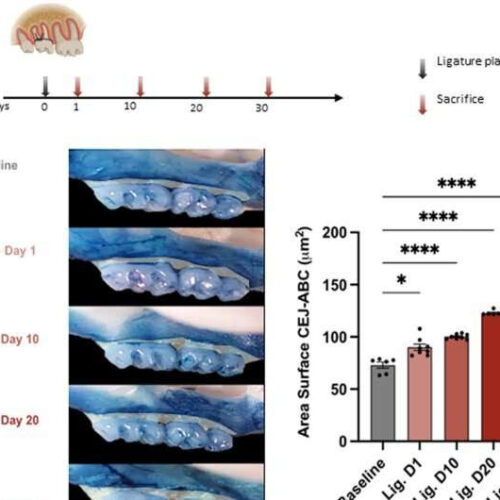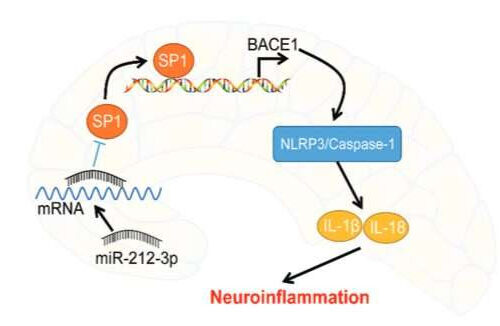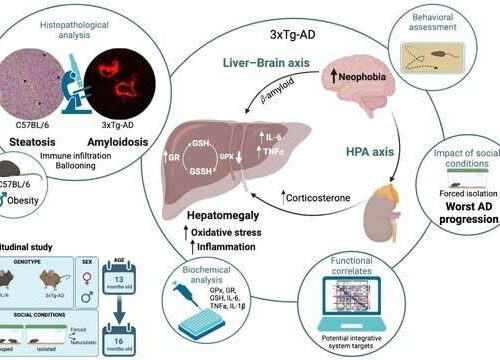Megan Brooks July 21, 2023 Treatment with an experimental oral tau aggregation inhibitor, hydromethylthionine mesylate (HMTM), led to a statistically significant reduction in an established biomarker of neurodegeneration in Alzheimer’s disease (AD) in the LUCIDITY phase 3 trial. Blood concentrations of neurofilament light chain (NfL) showed a 93% reduction in change over 12 months in participants receiving...
Category: <span>Alzheimer’s</span>
Enhanced light sensitivity may contribute to Alzheimer’s ‘sundowning,’ disease progression
UNIVERSITY OF VIRGINIA HEALTH SYSTEM IMAGE: HEATHER FERRIS, MD, PHD, OF THE UNIVERSITY OF VIRGINIA SCHOOL OF MEDICINE’S DIVISION OF ENDOCRINOLOGY AND METABOLISM, FOUND THAT ENHANCED LIGHT SENSITIVITY MAY PLAY A KEY ROLE IN ALZHEIMER’S DISEASE. CREDIT: UVA HEALTH New Alzheimer’s research from UVA Health suggests that enhanced light sensitivity may contribute to “sundowning” – the worsening...
Tau-based biomarker tracks Alzheimer’s progression
by Washington University School of Medicine Kanta Horie, PhD, works with a mass spectrometer that he uses to measure protein levels in cerebrospinal fluid samples. Horie and colleagues at Washington University School of Medicine in St. Louis and Lund University in Sweden have discovered that a form of the protein tau in the cerebrospinal fluid known...
New study links gum disease to buildup of Alzheimer’s plaque formation
by Forsyth Institute Alveolar bone resorption and mRNA expression levels of RANKL and OPG in periodontal tissues of mice with ligature-induced experimental periodontal disease. A) In vivo experimental design (n = 36, 7–8 mice per group). The baseline group was left untreated, and four groups had ligatures around maxillary right and left second molars for different timepoints corresponding...
A small molecule could help suppress Alzheimer’s-related inflammation and protect brain cells
by Association of Basic Medical Sciences of FBIH Molecular mechanism of miR-212-3p in AD-induced neuroinflammation. Credit: Bosnian Journal of Basic Medical Sciences Alzheimer’s disease (AD) is a progressive neurological disorder that causes the brain to shrink (atrophy) and brain cells to die. AD is the most common cause of dementia—a continuous decline in thinking, behavioral, and...
One Type of Exercise Could Alleviate And Even Delay Alzheimer’s Symptoms
HEALTH06 July 2023 By DAVID NIELD (RobertoDavid/iStock/Getty Images Plus) Working on your muscles could help delay the onset of Alzheimer’s symptoms, researchers have revealed. Researchers from the Federal University of São Paulo and the University of São Paulo in Brazil have uncovered strong evidence that resistance training – where muscles are worked against a weight or a force –...
Researchers show the importance of the liver-brain axis in Alzheimer’s disease
by Autonomous University of Barcelona A research team from the Universitat Autònoma de Barcelona (UAB) has studied the livers of Alzheimer’s disease mice models and described morphological, cellular, and functional alterations. In addition, they demonstrated the importance of the liver-brain axis regarding the psychological symptoms of the disease. Traditionally, research in Alzheimer’s disease has focused exclusively...
40 Hz Vibrations Reduce Alzheimer’s Pathology, Symptoms in Mouse Models
Tactile stimulation improved motor performance in Alzheimer’s mice models, reduced phosphorylated tau, preserved neurons and synapses, and reduced DNA damage, a new study shows. Evidence that noninvasive sensory stimulation of 40 Hz gamma frequency brain rhythms can reduce Alzheimer’s disease pathology and symptoms, already shown with light and sound by multiple research groups in mice and humans, now...
New study reveals how blood triggers brain disease
by Gladstone Institutes Katerina Akassoglou (left) and Andrew Mendiola (right) show how blood makes the brain’s immune cells toxic, pointing to new treatments for Alzheimer’s disease and multiple sclerosis. Credit: Michael Short/Gladstone Institutes In patients with neurological diseases like Alzheimer’s disease and multiple sclerosis, immune cells in the brain known as microglia that normally fulfill beneficial...
Healthy vascular fat during menopause may stave off dementia later in life
by University of Pittsburgh Credit: CC0 Public Domain A new study published in Alzheimer’s & Dementia is further evidence that the menopause transition is a particularly important time for women and their doctors to pay attention to heart health, in turn protecting their brain health. “It is shocking to know that two-thirds of Americans with Alzheimer’s disease are...








